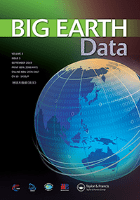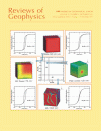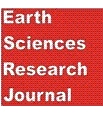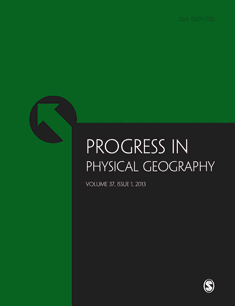
All Earth
Scope & Guideline
Exploring the Intersections of Earth Science and Policy
Introduction
Aims and Scopes
- Earth System Science:
The journal emphasizes research in Earth system science, investigating the interactions between the atmosphere, hydrosphere, biosphere, and geosphere, with a focus on understanding systemic changes and their implications. - Remote Sensing and Geospatial Analysis:
Utilizing advanced remote sensing technologies and geospatial analysis techniques to study land use changes, environmental monitoring, and natural resource assessments, providing critical data for informed decision-making. - Climate Change Impacts and Adaptation:
Research dedicated to assessing the impacts of climate change on various ecosystems and human societies, along with exploring adaptation strategies to mitigate these effects. - Natural Hazards and Risk Assessment:
A strong focus on the study of natural hazards, including earthquakes, landslides, and floods, and their associated risks, aiming to enhance preparedness and resilience in vulnerable regions. - Sustainable Resource Management:
Investigating sustainable practices in resource management, including water, soil, and biodiversity, to promote environmental health and sustainability. - Anthropogenic Influences on Natural Environments:
Exploring the effects of human activities, such as mining, urbanization, and agriculture, on natural environments and ecosystems, emphasizing the need for responsible stewardship.
Trending and Emerging
- Climate Resilience and Adaptation Strategies:
An increasing number of studies focus on developing resilience strategies to cope with climate change impacts, reflecting a growing urgency to address climate-related challenges in various regions. - Innovative Remote Sensing Techniques:
The use of advanced remote sensing methodologies, such as machine learning and deep learning, for environmental monitoring and resource management is gaining traction, emphasizing technological advancements in the field. - Interdisciplinary Approaches to Sustainability:
There is a rising trend of interdisciplinary research that combines environmental science with social sciences, economics, and policy studies, aiming to develop comprehensive solutions for sustainability. - Impact of Urbanization on Ecosystems:
Research investigating the effects of rapid urbanization on local ecosystems, particularly in the context of biodiversity loss and habitat degradation, is increasingly prevalent. - Public Health and Environmental Linkages:
Emerging studies are exploring the connections between environmental changes and public health, highlighting the importance of addressing environmental issues as part of global health strategies.
Declining or Waning
- Traditional Geological Studies:
There is a noticeable decrease in traditional geological studies focused solely on mineralogy and petrology, as the journal shifts towards more interdisciplinary approaches that integrate geology with environmental and societal concerns. - Static Models of Environmental Change:
Research employing static models to predict environmental changes has diminished, with a growing preference for dynamic and adaptive modeling techniques that account for real-time data and variability. - Local Case Studies Without Broader Implications:
The journal appears to be moving away from local case studies that do not offer insights or applications to broader global challenges, favoring studies that contribute to universal themes of sustainability and resilience.
Similar Journals

GLOBAL JOURNAL OF ENVIRONMENTAL SCIENCE AND MANAGEMENT-GJESM
Empowering interdisciplinary solutions for a sustainable future.Global Journal of Environmental Science and Management (GJESM), published under the distinguished leadership of Professor J. Nouri, is an esteemed academic platform dedicated to advancing the interdisciplinary discourse surrounding environmental science and management. With an ISSN of 2383-3572 and an E-ISSN of 2383-3866, GJESM has established itself as a prominent Open Access journal since 2014, allowing for unrestricted sharing of knowledge and research findings. Based in Iran, this journal caters to a diverse global audience, featuring contributions that span various critical domains including agricultural and biological sciences, environmental engineering, pollution management, and social sciences, evidenced by its impressive 2023 Q1 and Q2 quartile rankings across multiple categories. The journal’s Scopus rankings demonstrate a robust standing in the academic landscape, with exciting placements that underscore its relevance in key fields. By bridging the gap between scientific inquiry and practical application, GJESM serves as a vital resource for researchers, practitioners, and students seeking to understand and address the pressing environmental challenges faced by our planet today.

Vietnam Journal of Earth Sciences
Innovating Solutions for a Sustainable PlanetThe Vietnam Journal of Earth Sciences, ISSN 0866-7187, is a premier publication from the Publishing House Science and Technology based in Viet Nam, dedicated to fostering advancements in the field of Earth and Planetary Sciences. Operating under a Q2 ranking in the 2023 category of Earth and Planetary Sciences (miscellaneous) and positioned at Rank #62 out of 195 in its general category on Scopus, this journal serves as a critical platform for researchers, professionals, and students seeking to disseminate and engage with high-quality scientific findings. Despite being part of the non-open access model, the journal is committed to providing compelling content, encompassing a range of topics from geological hazards to environmental sustainability, ensuring its relevance and contribution to both local and international scientific communities. With coverage that spans from 2018 to 2024, the journal is poised to continue its role in addressing pressing Earth science issues and fostering collaborations among scholars in an increasingly interconnected world.

Big Earth Data
Advancing the Frontiers of Earth Science and TechnologyBig Earth Data is a prestigious open-access journal that has been at the forefront of advancing research in the intersection of earth science and computer technology since its inception in 2017. Published by TAYLOR & FRANCIS LTD in the United Kingdom, this journal is dedicated to disseminating groundbreaking findings and innovative methodologies in the fields of Earth and Planetary Sciences and Computer Science Applications. With a commendable impact factor and an impressive positioning in the Scopus rankings—claiming Q1 status in Computers in Earth Sciences and Q2 in Computer Science Applications—it serves as a vital resource for researchers, professionals, and students alike. The journal encourages submissions that explore the integration of big data technologies in managing, analyzing, and visualizing earth-related data, thereby fostering interdisciplinary collaboration. Since embracing its open-access model, Big Earth Data has enhanced the accessibility of high-quality research, promoting a broader dialogue in the scientific community and contributing to informed decision-making in global environmental challenges.

REVIEWS OF GEOPHYSICS
Connecting Scholars with Transformative Geophysical Ideas.REVIEWS OF GEOPHYSICS is a prestigious journal published by the American Geophysical Union, renowned for its critical contributions to the field of geophysics since its inception in 1963. With an impact factor that signifies its scholarly excellence and a Q1 ranking in Geophysics (2023), this journal is the leading platform for disseminating groundbreaking research across Earth and Planetary Sciences, currently holding the top position in its category. As a valuable resource for researchers, professionals, and students alike, it offers comprehensive reviews that synthesize significant advancements and theoretical insights, fostering the exchange of innovative ideas within the geophysical community. Although typically not an open-access journal, its influence is bolstered by its rigorous peer-review process and publication standards, ensuring that each article meets the highest academic criteria. Well-positioned in the heart of Washington, DC, the journal remains an essential reference for those seeking to remain at the forefront of geophysical research developments.

Earth Sciences Research Journal
Pioneering Research for a Changing WorldThe Earth Sciences Research Journal, published by the UNIV NACIONAL DE COLOMBIA, serves as a pivotal platform for the dissemination of knowledge in the diverse field of Earth and Planetary Sciences since its inception. With an ISSN of 1794-6190 and an E-ISSN of 2339-3459, this Open Access journal has been committed to providing unrestricted access to high-quality research since 2004. Located in Bogotá, Colombia, it has gained recognition within the academic community, achieving a Q3 quartile ranking in Earth and Planetary Sciences and notable Scopus rankings, which further underscores its relevance and reach. Its scope encompasses varied research topics, making it an essential resource for researchers, professionals, and students alike, seeking to contribute to or stay informed on the latest developments in the Earth sciences up to the year 2024. The journal not only anticipates cutting-edge research but also emphasizes collaborative dialogues among global experts, driving forward the conversation on critical issues facing our planet.

Progress in Physical Geography-Earth and Environment
Shaping understanding of our planet's complexities.Progress in Physical Geography-Earth and Environment is a premier academic journal published by SAGE Publications Ltd, renowned for its contributions to the fields of Earth and Planetary Sciences and Geography. With a distinguished history spanning from 1977 to 2024, this journal maintains a robust Q1 classification in both Earth and Planetary Sciences and Geography, Planning and Development, reflecting its high impact and rigorous scholarly standards. As evidenced by its Scopus rankings, it stands at the forefront of research, positioned in the 89th percentile among leading journals. Progress in Physical Geography aims to facilitate the exchange of innovative research, insights, and methodologies, making it an essential resource for researchers, professionals, and students dedicated to understanding and shaping the natural environment. While currently not designated as an Open Access journal, the wide accessibility of its content, combined with its significant impact factor, underscores its importance within the academic community seeking to advance knowledge and application in geography and environmental sciences.

ENVIRONMENTAL MANAGEMENT
Championing impactful research in ecology and pollution.ENVIRONMENTAL MANAGEMENT, published by Springer, stands at the forefront of advancing sustainability and ecological stewardship in the fields of Ecology, Global and Planetary Change, and Pollution. With an impressive tracking history from 1977 to 2024 and prestigious quartile rankings reflecting its significant impact (Q1 in Ecology and Q2 in both Global and Planetary Change and Pollution), this journal engages a wide range of stakeholders, including researchers, policymakers, and environmental professionals. The journal is a vital resource for those dedicated to addressing pressing global environmental challenges, publishing rigorous interdisciplinary research that informs policy and practice. While it does not offer open access, its content remains accessible through institutional subscriptions. Located in the heart of New York, ENVIRONMENTAL MANAGEMENT is dedicated to fostering a substantive dialogue on innovative approaches to environmental preservation and management.

Physio-Geo
Championing Open Access to Earth Science InsightsPhysio-Geo (ISSN: 1958-573X) is a distinguished open-access journal published by REVUES ORG, dedicated to advancing the fields of Earth and Planetary Sciences, with a special focus on Earth-Surface Processes, Environmental Science, and Ecology. Since its inception in 2007, Physio-Geo has provided a platform for researchers, professionals, and students to disseminate and access high-quality studies that contribute to the understanding of our environment. With a convergence period from 2019 to 2024, the journal aims to bridge disciplinary gaps and foster interdisciplinary research that addresses pressing ecological and environmental challenges. Despite its current Scopus rankings reflecting an early-stage development, the journal is poised to enhance its impact within the scientific community, particularly as it embraces a wider audience through its open-access model. By offering valuable insights and comprehensive analyses, Physio-Geo is an essential resource for those seeking to explore the complex interactions between physical geography and ecological systems.

Journal of Mountain Science
Fostering Interdisciplinary Dialogue on Mountain ScienceThe Journal of Mountain Science, published by SCIENCE PRESS, is a distinguished academic journal dedicated to advancing the understanding of mountain environments and their significance in various scientific domains. With an ISSN of 1672-6316 and an E-ISSN of 1993-0321, this journal has carved a niche in the field of Earth sciences, earning a commendable Q2 ranking in categories such as Earth-Surface Processes, Geography, Planning and Development, and Geology, as well as a Q3 ranking in Global and Planetary Change. Since its inception in 2007, the journal has been pivotal in fostering interdisciplinary research that addresses critical environmental issues, making it an essential resource for researchers, professionals, and students alike. While currently not offering open access, it provides valuable insights into areas including nature conservation and landscape management, with a focus on the unique challenges faced by mountainous regions. Located in Beijing, China, the Journal of Mountain Science continues to promote scholarly discourse that contributes to the sustainable development of mountain communities and ecosystems until 2024 and beyond.

Journal of Asian Earth Sciences-X
Fostering Collaboration for Sustainable Earth SolutionsJournal of Asian Earth Sciences-X, a distinguished publication by ELSEVIER, is at the forefront of Earth and planetary sciences, particularly focusing on the dynamic fields of geology and earth-surface processes. As an Open Access journal since 2019, it provides unparalleled access to high-quality research, fostering global collaboration and dissemination of knowledge. With an impressive impact factor and ranking in the Q2 category for both Earth-Surface Processes and Geology, it serves as a crucial platform for researchers, professionals, and students alike to share their findings and insights. Situated in the United Kingdom, the journal thrives on contributions that enhance our understanding of Asian geosciences within a broader global context, aiming to tackle major challenges such as climate change and natural resource management. By bridging regional studies with global perspectives, the Journal of Asian Earth Sciences-X is not only a vital resource for academia but also supports sustainable development initiatives across the region.